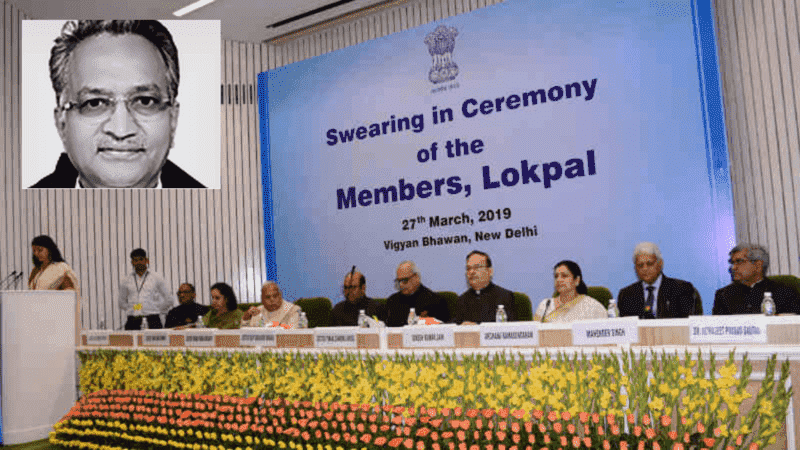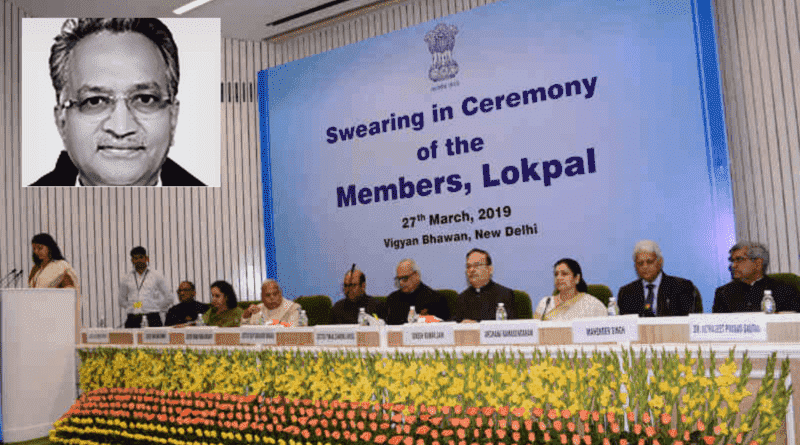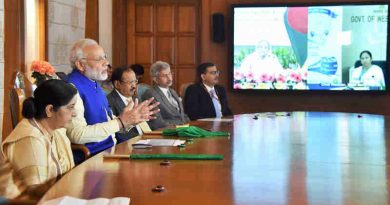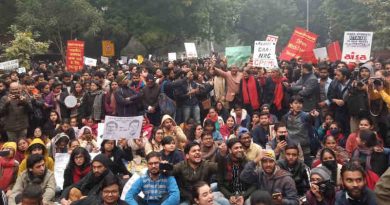Justice Khanwilkar with Dubious Record to Head Anti-Corruption Outfit Lokpal

Justice Khanwilkar with Dubious Record to Head Anti-Corruption Outfit Lokpal
Justice Khanwilkar’s unscrupulous record as a Supreme Court judge is being widely denounced on social media by people.
By Rakesh Raman
A former Supreme Court judge Ajay Manikrao Khanwilkar has been appointed as the chairperson of India’s top anti-corruption ombudsman Lokpal. His appointment was announced on February 27, 2024 – after keeping the Lokpal chairperson’s position vacant for about two years.
Khanwilkar was handpicked by a committee comprising prime minister (PM) Narendra Modi, Chief Justice of India (CJI) D.Y. Chandrachud, and Leader of the Opposition in Lok Sabha, Adhir Ranjan Chowdhury.
After retiring from the Supreme Court in July 2022, Khanwilkar has been rewarded with the plum position at the Lokpal office largely because of his judgments in favour of Modi or the Modi regime.
DUBIOUS JUDGMENTS BY KHANWILKAR
As a member of a 2022 bench, Justice Khanwilkar dubiously dismissed a plea of Zakia Jafri to exonerate Modi who was the prime accused in the Gujarat massacre of 2002 in which thousands of people – mainly Muslims – were murdered.
Zakia Jafri – the wife of MP Ehsan Jafri who was murdered in the Gujarat riots – had challenged the Special Investigation Team’s (SIT) clean chit to 64 people, including Modi who was the chief minister of Gujarat when the pogrom happened. The 2023 BBC documentary ‘India: The Modi Question’ sheds light on Modi’s role in Gujarat violence.
Khanwilkar not only dismissed Jafri’s petition, but also pronounced the hostile judgment that was used by the Gujarat Police on the following day to arrest activist Teesta Setalvad and former IPS officer R. B. Sreekumar on charges of fabricating evidence linked to the Gujarat riots.
In 2022, with another judgment to help the Modi regime, Khanwilkar while heading a three-judge bench upheld the Foreign Contribution (Regulation) Amendment Act, 2020 to regulate NGOs’ access to foreign donors.
The Modi government has frequently attacked NGOs and civil society organizations through draconian FCRA regulations so that they do not criticize the government’s autocratic actions.
As the opposition parties often complain that Modi misuses the agencies such as the Enforcement Directorate (ED) to target his opponents, in 2022 Khanwilkar – with a controversial judgment – enhanced ED’s powers under the Prevention of Money Laundering Act (PMLA).
Khanwilkar’s unscrupulous record as a Supreme Court judge is being widely denounced on social media by people. As post-retirement benefits to judges influence their pre-retirement judgments, Khanwilkar is a beneficiary of this evil trend.
CORRUPT JUDICIARY
But Khanwilkar is not alone who has been gifted for his blind loyalty to the Modi regime. A former Chief Justice of India (CJI) Ranjan Gogoi was rewarded with membership of Rajya Sabha, the upper house of India’s parliament. With his bias toward the Modi government, Gogoi – who retired in November 2019 – was largely working as a government spokesperson.
During his tenure, he had completely tarnished the image of the Supreme Court which had been reduced to the level of a party office of Modi’s Bharatiya Janata Party (BJP). As a judge, Gogoi was pronouncing judgments such as the Ayodhya verdict and decision on the Rafale corruption case to meet Modi’s expectations.
Similarly, a former Supreme Court judge, Justice Arun Kumar Mishra, was handpicked in 2021 by the Modi government for the post of National Human Rights Commission (NHRC) chairperson because of his sycophancy for Modi. While Mishra does not have any record in the human rights sphere, he was selected despite strong opposition to his selection.
Senior Congress leader and Leader of Opposition in Rajya Sabha Mallikarjun Kharge – who was a member of the selection committee – dissociated himself from the process of NHRC chairperson’s selection.
“In my letter to PM Modi, I raised concerns regarding the manner in which the NHRC appointments were made,” Kharge wrote in his tweet on June 2, 2021. He added that Mishra’s appointment smacks of partisanship and quid pro quo. “I strongly condemn this,” Kharge stated.
Mishra had retired from the Supreme Court in September 2020 and during his tenure he pronounced many wrong judgements to please Modi and brazenly admired him presumably to grab a lucrative position after retirement. [ You can click here to read How Justice Arun Mishra Rose to Become the Most Influential Judge in the Supreme Court ]
Speaking at the International Judicial Conference in 2020, Justice Mishra had described Modi as an “internationally acclaimed visionary”, and praised his “versatile genius to think globally and act locally.”
Mishra’s remarks were so shameful that the Supreme Court Bar Association (SCBA) had to issue a resolution to denounce his admiration for Modi while the judges are supposed to maintain a safe distance from politicians. In its statement, the SCBA said it has taken note with deep sense of anguish and concern the statement made by Mishra to praise Modi.
The SCBA, according to the statement, also expressed that such proximity and familiarity may impact the decision making process by the judges and may give rise to justifiable doubts in the minds of the litigants about the outcome.
As a journalist and human rights defender, in October 2023, I filed a petition at the Human Rights Council Branch of the Office of the United Nations High Commissioner for Human Rights to remove and prosecute Mishra.
In another case, a retired judge Surendra Kumar Yadav, who gave the verdict in the controversial Babri mosque demolition case in 2020, was given the lucrative up-Lokayukta (deputy Lokayukta) position in Uttar Pradesh in 2021.
The office of Lokayukta is an anti-corruption authority that investigates cases related to corruption, government mismanagement, or abuse of power by public servants or ministers.
In fact, in all autocratic regimes that work under the garb of democratic systems, the rulers silently use courts to impose their own decisions on citizens and suppress all kinds of dissent.
[ Research Report: Decayed Digital Courts, Virtual Courts, e-Courts of India ]
RAMPANT CORRUPTION IN MODI REGIME
Earlier, K.V. Chowdary – who had retired as the Central Vigilance Commissioner (CVC) which is India’s top anti-corruption organization – was hired as additional director on the board of Reliance Industries Limited (RIL) led by Mukesh Ambani.
Ambani is a close capitalist friend of Modi, who has been embroiled in multiple corruption scandals. As the CVC of India, Chowdary intervened to get all investigations against Modi dropped.
As the Modi government has given top administrative and judicial posts to its own loyal men who could cover up the crime and corruption cases in which top BJP politicians including Modi are involved, there was a huge controversy over the manner the previous Lokpal Justice Pinaki Chandra Ghose was appointed.
Multiple reports suggest that the entire exercise of the appointment of Lokpal was held in a shady manner and Lokpal was ignoring the corruption cases of top politicians and bureaucrats in the Modi regime.
Since the Lokpal office under Justice Pinaki Chandra Ghose was causing serious harm to the citizens of India, people protested against its poor performance. An online petition exposed the corruption at Lokpal office which is supposed to stop corruption in the country. The petition asserted that the Lokpal officials are squandering huge public money without any accountability.
Available on an American public petition website, the 2022 petition argues that the Lokpal office has completely failed to check corruption and it has become a senior citizens’ club. Since the Lokpal performance has been pathetic, people have stopped filing their complaints to the anti-corruption ombudsman.
The petition urged the Lokpal bureaucrats that if they are not able to perform, they must resign from their positions. Moreover, in 2022, I sent a petition to the President and the Chief Justice of India with the appeal to remove Lokpal Justice Pinaki Chandra Ghose under charges of non-performance and dereliction of duty.
Recently, another Judge A.K. Vishvesha has been appointed as Lokpal of Dr. Shakuntala Misra National Rehabilitation University, Lucknow, for his immoral judgment on Gyanvapi Mosque.
His judgment that favoured the anti-Muslim Hindutava agenda of the Modi regime permitted the family of a late priest the right to resume ‘pooja’ in the southern cellar of the Gyanvapi Mosque after three decades. Astonishingly, Vishvesha passed the judgment on his last working day as a district judge on January 31, 2024.
DISHONEST SUPREME COURT JUDGES
The judges – particularly of the Supreme Court – deliver weekend academic lectures on constitution, democracy, and justice. But they do not practice in courts what they preach in their academic discourse. All that they say is meaningless rhetoric because when they sit in their courts as judges, they leave no stone unturned to crush democracy and violate all norms of the constitution.
It has been seen in multiple cases during the past few years. The judges in high courts and lower courts are so naive that they cannot even deliver lectures on law and justice while their court decisions are mostly wrong.
Since the corrupt judges in the Supreme Court and other courts of India expect post-retirement positions and other benefits, they work lawlessly in courts as agents of the Modi regime. As a result, corruption has been increasing exponentially in India.
In its global report released in January 2024, Transparency International notes that corruption is increasing in those countries which are experiencing a decline in the functioning of justice systems. In this context, it cites the Rule of Law Index of the World Justice Project, which confirms the deteriorating justice delivery system in India.
According to the latest 2023 Rule of Law Index, India’s score declined from 0.50 in 2022 to 0.49 in 2023 and India ranked 79th across 142 countries in 2023 while the civil and criminal justice systems in the country are on the verge of collapse. The World Justice Project findings are consistent with the incidents of increasing judicial corruption in India.
While India is already a majoritarian nation, a senior advocate and former president of Supreme Court Bar Association, Dushyant Dave, observes that the judiciary in India has also become a “majoritarian judiciary.”
In an interview on January 28, 2024 with LiveLaw news service, Dave said that the judiciary – including the Supreme Court – is remaining silent while several transgressions of law are taking place at the instance of the Executive (Modi regime). These transgressions by the judiciary are also being seen in corruption cases where the judges are complicit in state crimes.
Moreover, a slew of former Supreme Court judges – particularly Justice Madan B. Lokur – is delivering lectures to expose the unethical working in the top court and other courts of India.
And leading Supreme Court lawyers are also revealing the cases of massive corruption in the Indian judiciary. You can also click here to watch a video about judicial corruption and the bad state of Indian judiciary.
CORRUPTION CASES IN MODI GOVERNMENT
Since judges are corrupt, they do not take action against corrupt bureaucrats and politicians. In the Adani case, for example, the Supreme Court deceptively exonerated the Adani Group in the money laundering and accounting fraud case because oligarch Gautam Adani is a partner of PM Modi.
In fact, the Modi-Adani collusion case is termed as the Modani (portmanteau for Modi and Adani) corruption scandal, which is perhaps the biggest grand corruption crime in the history of mankind.
The other corruption cases in which the Indian judiciary succumbed and dishonestly protected the Modi regime include PM-CARES Fund case, Rafale corruption case, Sri Lanka energy project case involving Adani Group, Modi-Adani collusion case, Sahara-Birla payoff case, Predator Drone deal, and a number of other cases in which Modi’s party colleagues are allegedly involved.
Now, as Khanwilkar’s unethical record shows, he will also not take any steps to stop corruption in the Modi regime. Rather, as the Lokpal chairperson he is also expected to provide impunity to Modi and other corrupt functionaries in his government.
According to a February 28 report in The Indian Express, the government has also appointed six members, including three judicial members, to the Lokpal. Former Himachal Pradesh High Court Chief Justice Lingappa Narayana Swamy, former Allahabad High Court Chief Justice Sanjay Yadav, and former Karnataka High Court Chief Justice and Law Commission Chairperson Ritu Raj Awasthi are judicial members.
The non-judicial members are former Chief Election Commissioner Sushil Chandra, former Chief Secretary of Gujarat Pankaj Kumar, and former Rural Development Secretary Ajay Tirkey.
The Lokpal chairperson and the members are appointed for a term of five years or serve till they attain the age of 70 years, whichever is earlier.
By Rakesh Raman, who is a national award-winning journalist and social activist. He is the founder of the humanitarian organization RMN Foundation which is working in diverse areas to help the disadvantaged and distressed people in the society.
He has also been publishing The Integrity Bulletin news magazine since 2018 to cover local and international corruption issues to engage with different stakeholders who are trying to combat corruption in the world.
In order to inform the Indian citizens and the global community about the extent of corruption in India, he compiled and released in October 2023 a comprehensive research report “India Corruption Research Report 2023 (ICRR 2023)”. It is the second annual report on corruption in India while the first report ICRR 2022 was released in October 2022.
He runs a community-driven anti-corruption social service “Clean House” to help the residents of Delhi raise their voice against the growing corruption and injustice in housing societies where millions of people suffer because of rampant corruption and lawlessness.





